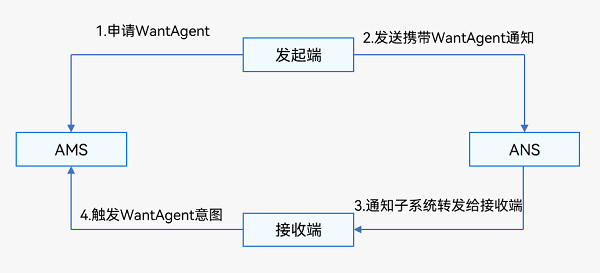为通知添加行为意图
WantAgent提供了封装行为意图的能力,该行为意图是指拉起指定的应用组件及发布公共事件等能力。OpenHarmony支持以通知的形式,将WantAgent从发布方传递至接收方,从而在接收方触发WantAgent中指定的意图。例如在通知消息的发布者发布通知时,通常期望用户可以通过通知栏点击拉起目标应用组件。为了达成这一目标,开发者可以将WantAgent封装至通知消息中,当系统接收到WantAgent后,在用户点击通知栏时触发WantAgent的意图,从而拉起目标应用组件。
为通知添加行为意图的实现方式如下图所示:发布通知的应用向应用组件管理服务AMS(Ability Manager Service)申请WantAgent,然后随其他通知信息一起发送给桌面,当用户在桌面通知栏上点击通知时,触发WantAgent动作。
图1 携带行为意图的通知运行机制

接口说明
具体接口描述,详见WantAgent接口文档。
| 接口名 | 描述 |
|---|---|
| getWantAgent(info: WantAgentInfo, callback: AsyncCallback<WantAgent>): void | 创建WantAgent。 |
| trigger(agent: WantAgent, triggerInfo: TriggerInfo, callback?: Callback<CompleteData>): void | 触发WantAgent意图。 |
| cancel(agent: WantAgent, callback: AsyncCallback<void>): void | 取消WantAgent。 |
| getWant(agent: WantAgent, callback: AsyncCallback<Want>): void | 获取WantAgent的want。 |
| equal(agent: WantAgent, otherAgent: WantAgent, callback: AsyncCallback<boolean>): void | 判断两个WantAgent实例是否相等。 |
开发步骤
-
使能通知开关,获得用户授权后,才能使用通知功能。
-
导入模块。
import notificationManager from '@ohos.notificationManager'; import wantAgent from '@ohos.app.ability.wantAgent'; -
创建WantAgentInfo信息。
场景一:创建拉起UIAbility的WantAgent的WantAgentInfo信息。
let wantAgentObj = null; // 用于保存创建成功的wantAgent对象,后续使用其完成触发的动作。 // 通过WantAgentInfo的operationType设置动作类型 let wantAgentInfo = { wants: [ { deviceId: '', bundleName: 'com.example.myapplication', abilityName: 'EntryAbility', action: '', entities: [], uri: '', parameters: {} } ], operationType: wantAgent.OperationType.START_ABILITY, requestCode: 0, wantAgentFlags:[wantAgent.WantAgentFlags.CONSTANT_FLAG] };场景二:创建发布公共事件的WantAgent的WantAgentInfo信息。
let wantAgentObj = null; // 用于保存创建成功的WantAgent对象,后续使用其完成触发的动作。 // 通过WantAgentInfo的operationType设置动作类型 let wantAgentInfo = { wants: [ { action: 'event_name', // 设置事件名 parameters: {}, } ], operationType: wantAgent.OperationType.SEND_COMMON_EVENT, requestCode: 0, wantAgentFlags: [wantAgent.WantAgentFlags.CONSTANT_FLAG], }; -
调用getWantAgent()方法进行创建WantAgent。
// 创建WantAgent wantAgent.getWantAgent(wantAgentInfo, (err, data) => { if (err) { console.error(`Failed to get want agent. Code is ${err.code}, message is ${err.message}`); return; } console.info('Succeeded in geting want agent.'); wantAgentObj = data; }); -
构造NotificationRequest对象,并发布WantAgent通知。
// 构造NotificationRequest对象 let notificationRequest: notificationManager.NotificationRequest = { content: { contentType: notificationManager.ContentType.NOTIFICATION_CONTENT_BASIC_TEXT, normal: { title: 'Test_Title', text: 'Test_Text', additionalText: 'Test_AdditionalText', }, }, id: 1, label: 'TEST', wantAgent: wantAgentObj, } notificationManager.publish(notificationRequest, (err) => { if (err) { console.error(`Failed to publish notification. Code is ${err.code}, message is ${err.message}`); return; } console.info('Succeeded in publishing notification.'); }); -
用户通过点击通知栏上的通知,系统会自动触发WantAgent的动作。